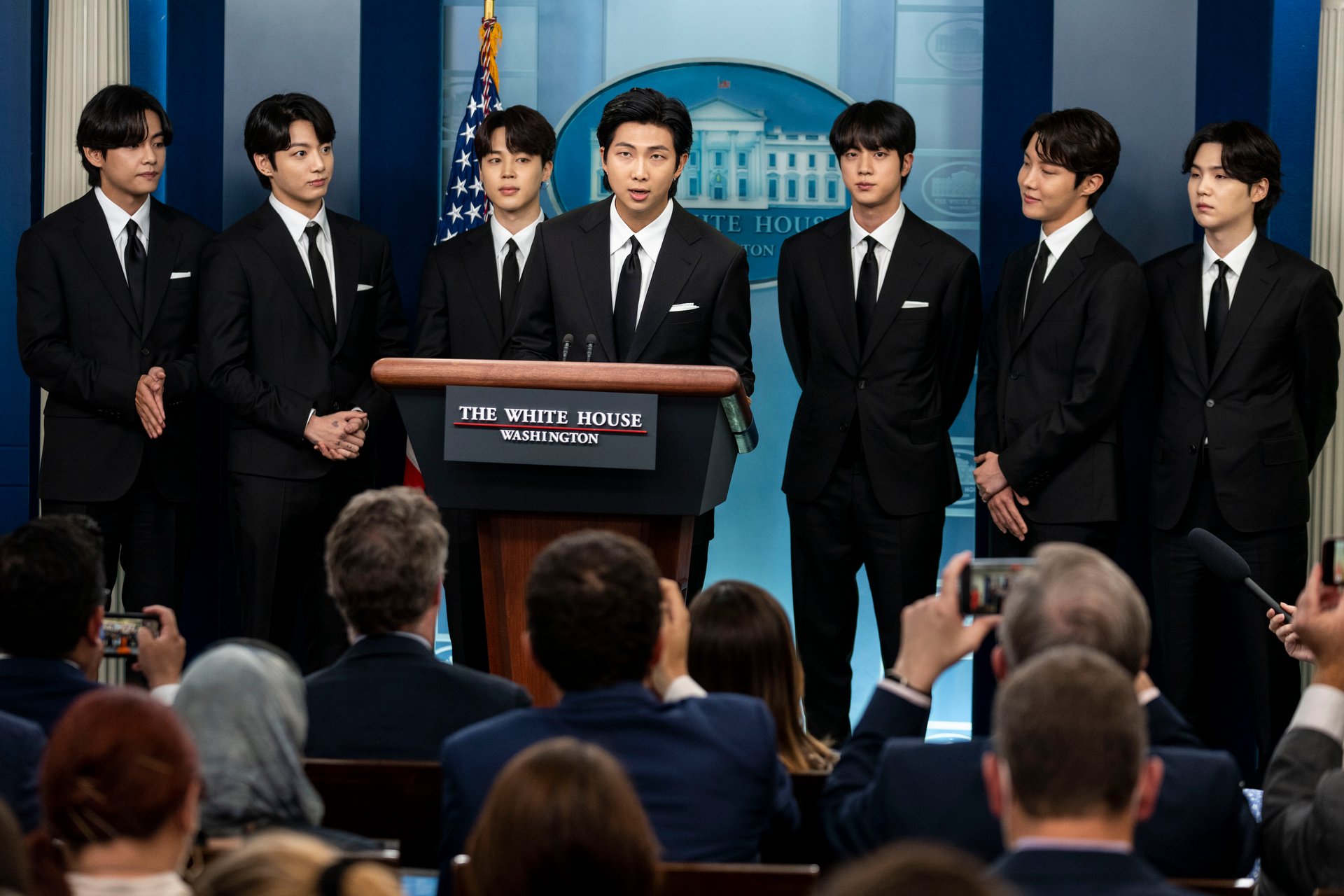BTS is back. Here’s how it will grow the global economy and South Korea’s GDP
BTS is much more than just a musical group — it's a global financial power and a "strategic national asset"

Kent Nishimura/Los Angeles Times via Getty Images
After almost three years on hiatus, BTS is about to make noise — not just on the charts, but in the global markets. By the time all seven members of the K-pop group complete their mandatory military service this month, they won’t just be lacing up for a comeback — they’ll be rebooting one of South Korea’s most potent economic powerhouses.
Suggested Reading
Six members — Jin, j-Hope, RM, V, Jimin, and Jungkook — have finished their time in the army (not to be confused with their fandom, which is called ARMY) with the seventh, Suga, set to rejoin civilian life within days. And as much as fans are thrilled for all seven to be back in the recording studio, there’s another group that's equally hyped for the reunion: investors, economists, and South Korean officials who know exactly what the phrase “BTS comeback” means for the country’s GDP.
Related Content
Because BTS isn’t just a group. It’s a global emotional support system, a cultural juggernaut, a fashion tour de force, a soft power flex, and — yes — a multibillion-dollar economic ecosystem. Its reunion is expected to ripple far beyond fans and music charts and straight into the Korean economy — and beyond.
It won't be the first time BTS has had an outsized financial impact.
In 2019, a report from the Hyundai Research Institute estimated that BTS brought in over $4.65 billion annually to South Korea’s economy — on par with the contribution of nearly half a million average Korean workers. That figure doesn’t just include album sales or ticket revenue but also tourism, consumer products, language learning, streaming traffic, and even spinoff exports such as cosmetics and fashion.
When BTS played a one-off, free concert in Busan in 2022, in support of the city’s World Expo bid, the event attracted over 50,000 visitors and was estimated to contribute more than $500 million in economic value. A post-hiatus world tour could easily multiply that impact several times over.
But beyond the hard numbers, BTS represents a kind of cultural capital that few other entities — not even K-pop as a whole — can replicate. The group is arguably the single most influential driver of the so-called “Korean Wave,” or “hallyu,” which has reshaped global pop culture over the past decade. Its influence has helped make Korean fashion, food, and entertainment (think: K-dramas) aspirational worldwide, fueling growth for everything from Netflix subscriptions to LVMH investments in Korean brands. (The members all have brand deals with top fashion companies.) In recent years, Korean has become one of the fastest-growing languages studied on apps such as Duolingo.
South Korea’s tourism board has repeatedly credited BTS with helping drive inbound travel, and in pre-pandemic years, nearly 8% of tourists cited BTS as one of their reasons for visiting. And now, BTS has reasserted its market power: Shares in HYBE, the group’s agency, surged 7% in a single day in early June, hitting a 38-month high after news that RM, V, Jimin, and Jungkook had officially completed their service. Analysts see the group’s return as a bullish signal for HYBE (which has expanded into the U.S) and for the broader entertainment and media complex built around K-pop’s global reach.
The group’s post-military plans are still under wraps, but expectations are high for new music by the end of 2025, followed by a global tour that could easily become one of the most lucrative in history. BTS’s last full-scale tour, “Love Yourself: Speak Yourself,” grossed over $200 million — without even covering the globe. A four-night run of performances for a “Permission to Dance on Stage” in late 2021 likely injected more than $100 million into the Los Angeles economy via tourism, hospitality, and related spending; and the four-night Las Vegas leg generated over $160 million in tourism and associated economic activity.
A post-pandemic, post-hiatus version could easily knock those numbers out of the park, with knock-on effects in every city the group plays. Flights, hotels, restaurants, and local retail often see major surges in BTS-connected cities, especially given the group’s unusually mobile — and highly dedicated — international fanbase.
That level of fandom has made BTS not just a cultural product but an economic ecosystem. HYBE has built a digital platform — Weverse — that has become a key monetization engine for fandoms: a $100 million revenue stream—high-margin, digitally savvy, and ready to monetize fandoms like never before. Through livestreams, merchandise, and artist-to-fan interactions, HYBE has been able to drive recurring revenue even without new BTS music.
But perhaps the most valuable impact is the hardest to quantify. BTS’s success has reframed how South Korea is seen on the global stage — transforming the country’s image from tech-forward but culturally niche to trend-setting and culturally magnetic. BTS is mentioned alongside Oscar-winning director Bong Joon-ho, soccer star Son Heung-min (who called BTS “national heroes”) as the country’s biggest exports. BTS has been invited to speak at the UN, partnered with UNICEF, and collaborated with South Korea’s Ministry of Culture to promote tourism.
As a soft power asset, BTS arguably rivals the likes of the Olympics or a global sporting franchise. The difference is: BTS is still running. And now, the group is entering a new era. And to say its fans are excited is an understatement (just ask this author). Analysts at Hana Financial have called BTS “a strategic national asset,” and government officials have quietly echoed the sentiment.
Few other music groups could be credited with moving national GDP — but then again, few other music groups could ever be BTS.
